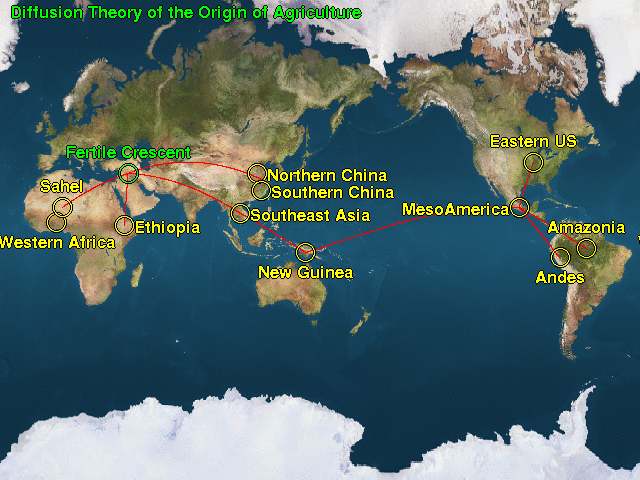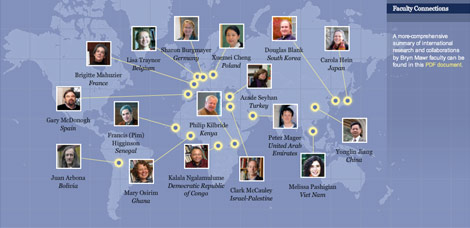Serendip is an independent site partnering with faculty at multiple colleges and universities around the world. Happy exploring!
Randomness as (the absence of?) explanation
Towards Day 9 of Evolving Systems course
Cf. Diamond's "diffusion theory of agriculture" w/ BMC's new
"map of faculty connections" (with bilateral movements....?)


Kirsten: these changes ... all spread out. Culturally, animals have spread out throughout the world. The universe is constantly expanding, and biologically people have traveled, married other people and spread their genes throughout the world.
I. coursekeeping
did everyone get cake?
attend any portion of/learn anything from the
conference on "History and Hope:
Women's Education in a Global Context"?
my key notes from Helen Horowitz's keynote speech
(which focused on the "history," not the "hope"):
when Bryn Mawr was getting established, M. Carey Thomas had to
fight against current evolutionary science, which highlighted
the distinctiveness of male and female bodies:
women had adapted to bear and feed young,
which meant they needed a distinct education:
"could not study and menstruate @ the same time";
"the miseducation of women was a primary cause of their 'hysteria'" (nervous disease)
MCT countered the belief in the biological WRONGNESS of women's education with new scientific studies on inheritance: shown to inherit intellectual capacities equally from mothers and fathers, girls were "crushed by the American environment," not "enabled by circumstances to use their powers"
it's a story about the force of social convention: the consequences
of being "cut off from essential association with other scholars"
it's also a story about the misuse of the story of evolution to explain social patterns (="social Darwinism" as an explanation for why some people flourish more than others; one of the stories Diamond is countering w/ his geographical explanations)
Aimee: By discussing cultural evolution, we are flirting with some dangerous beliefs: racism, ethnocentrism, and nativism .... in the decades following the release of Darwin's Origin of Species, Herbert Spencer, a British biologist and social philosopher, created Social Darwinism ... the idea that human cultures have evolved so that superior, more intelligent societies have rightfully dominated lesser peoples.
[unasked] Q&A re:
the relation between mental work and mental health
II. back to the local!
conferences tomorrow w/ Bingqing, Tiannan, Sarah, Kirsten, Betrice
(Sarah: how 'bout moving permanently to 11?)
by tomorrow evening, e-mail the first paper in this second section of the course (looping back again to begin w/ what you already know,
before nudging into some as-yet-unknown spaces...):
write about the evolution of a culture with which you are familiar.
Be clear about how you know what you know (doesn't have to be personal; does have to draw on additional resources, include a works cited list, p. #s and a motivating question!)
for Thursday we'll continue our discussion
of cultural evolution w/ help from
- two articles from a Feb. 2004 special issue of Science Magazine
on the Evolution of Language: "Speaking in tongues" and "The
first language," and - a Mar. 2004 New York Times article about "Niles Eldredge:
Bursts of Cornets and Evolution"
topic anticipated by Olivia: We don’t tend to explain things specifically because our language allows us not to .... language can also affect the evolution of cultures
and picked up quite productively by JulieG, next door, in two directions: the link between culture and language ... is something I studied a little .... the Greeks introducing the first fully phonetical alphabet ... enabled multiple words to be formed based on sounds made, creating a literate and philosophical culture where new words could be readily formed and recorded .... it enabled the transition of emphasis from the collective to the individual [cf. Mandarin's logogrammatic alphabet: less malleable?]
[and yet!]
I have noticed ... your statement "on how Chinese people think," that it is possible to speak of the largest population in the world as having one methodology of thought .... I doubt highly that the same could or would be conjectured of and by American people.
III. these are teases for Thursday;
for today, you'd posted your reactions to our just-begun discussion about cultural evolution: What sorts of links do you see, or not, between changes in the physical world and other kinds of change? To what extent do you think that cultural change has patterns and explanations similar to those involved in cosmological, geological, and biological changes?
start with a comment on one of the
papers we read together last week:
nina44: "I'd say a soul is the indestructible essence of an individual". "The uniqueness of one person is indefinite and cannot be broken." I just wanted to say that whoever wrote this paper did a very wonderful job. These two are my favorite lines from your essay and I feel like it did the description of a soul justice.
are souls (=selves) infinite? revisable? do they
evolve, or are they "fixed" and "unbreakable"?
 FluteSound4: Does a soul evolve in us like our intellect or biological make up?
FluteSound4: Does a soul evolve in us like our intellect or biological make up?
I've always believed in souls ... because the idea ... gives me hope that there's more meaning and purpose to life ....
are our beliefs the result of need, rather than observation?
we'll talk much more about individual evolution in a few weeks--
Bingqing: I really enjoy the path to self-identification. We are journeying ....
--but for now, let's locate our discussion on the cultural level:
Bingqing: During the discussion on Thursday, I was intrigued by the connections between seemingly irrelative things—the geography, the domestic animals and the empire. Perhaps, nothing exists independently in the world. (This point of view reminds me of the “Trees” on planet Pandora in film Avatar). How could I still believe that individuals are individual?....
wherefrom our uniqueness? are we...?
ecollier: I'll share this sort-of creation myth with everyone.
Its amazing: The Egg.
 Olivia: what’s the purpose of cultures?
Olivia: what’s the purpose of cultures?
What’s the direction of the evolution in cultures?
or: what are the mechanisms whereby cultures evolve?
 nina44: I love the idea that traditions have been passed on for centuries, but that these traditions ... must evolve or they will die out .... Take Bryn Mawrs traditions for example, when parade night was first established freshman girls just walked ... Today we run through and get hit with water balloons, candy, flowers, and confetti.
nina44: I love the idea that traditions have been passed on for centuries, but that these traditions ... must evolve or they will die out .... Take Bryn Mawrs traditions for example, when parade night was first established freshman girls just walked ... Today we run through and get hit with water balloons, candy, flowers, and confetti.
SoundsLikeBanana: Diamond's ideas were logical but at the same time still seemed like speculation .... I still didn't want to chalk up culture to geography. Obviously there is more to thousands of years of storytelling, festivals, and ideals than geography.
Bingqing: I had never imagined that the result brought by one kind of crops or domestic mammals can influence the development of a whole empire. I was overwhelmed by the relation between cause and effect. I felt my understanding about the “cause and effect in the world” superficial.
ecollier: I've never thought of randomness as the absence of explanation.
Julie G: how unfair this seemed to me. I want to hold to the belief that the harder one fights for something, the greater the reward. It makes sense, but seems so unfair that people born in areas with arable land, domesticable animals, and farmable crops benefit far more from their labors than those who come from areas with arid land, animals that cannot be tamed, and low-yielding crops. But perhaps this is further example of the "randomness" that we had talked of in class with physical evolution; fairness and justice had nothing to do with it. Yet, when humans are involved, it seems as if they should.
I wonder if this difference in agriculture also bleeds into other areas of culture. For example, the creation myths ... from outside the Fertile Crescent area involved the production/obtaining of food as central parts for explaining creation .... In Karina's Mayan myth, men were created out of corn -- the staple crop that Diamond wrote of for that region. Contrarily, stories ... from the Fertile Crescent area have little ... emphasis on food, or crops,
So far I believe [the evolutions of science and the evolutions of cultures] are totally different.
What affect the evolution of science is purely observations or new discoveries, but what affect the evolution of culture can be countless: politics, history events, economics, landscapes, and even climates.
could science be understood as a discipline of controlling the variables that in the world are uncontrolled? why would you do that? think of Paul's model of "Evolution as Reproduction with Variability"--what did he leave out? why? what did that "get us"?
Paige: I see that nature and manmade are ... composed of interacting elements .... how far can we move culture and our lifestyles from nature? ... Is it good to separate the human from the land?
....So: what about China??
(from p. 454 of Diamond's 2003 Afterword:) "An area of active discussion since 1997 falls under a heading that could be termed "Why Europe, not China?... Why, among Eurasians, was it Europeans rather than Chinese or some other group that expanded?... argued in detail by Graeme Lang: "Differences between Europe and China in ecology and geography helped to explain the very different fates of science in the two regions. First, [rainfall] agriculture in Europe provided no role for the state ... and when the agricultural revolution in Europe produced a growing agricultural surplus, this allowed the growth of relatively autonomous towns along with urban institutions .... [Irrigation and water-control] agriculture in China, by contrast, favored the early development of intrusive and coercive states in the major river valleys, while towns and their institutions never achieved the degree of local autonomy found in Europe. Second, the geography of China, unlike that of Europe, did not favor the prolonged survival of independent states. Instead, China's geography facilitiated eventual conquest and unification over a vast area, followed by long periods of relative stability under imperial rule. The resulting state system suppressed most of the conditions required for the emergence of modern science.... Such explanations can always be challenged with a further question: why were Europe and China different with regard to those social or cultural factors?




